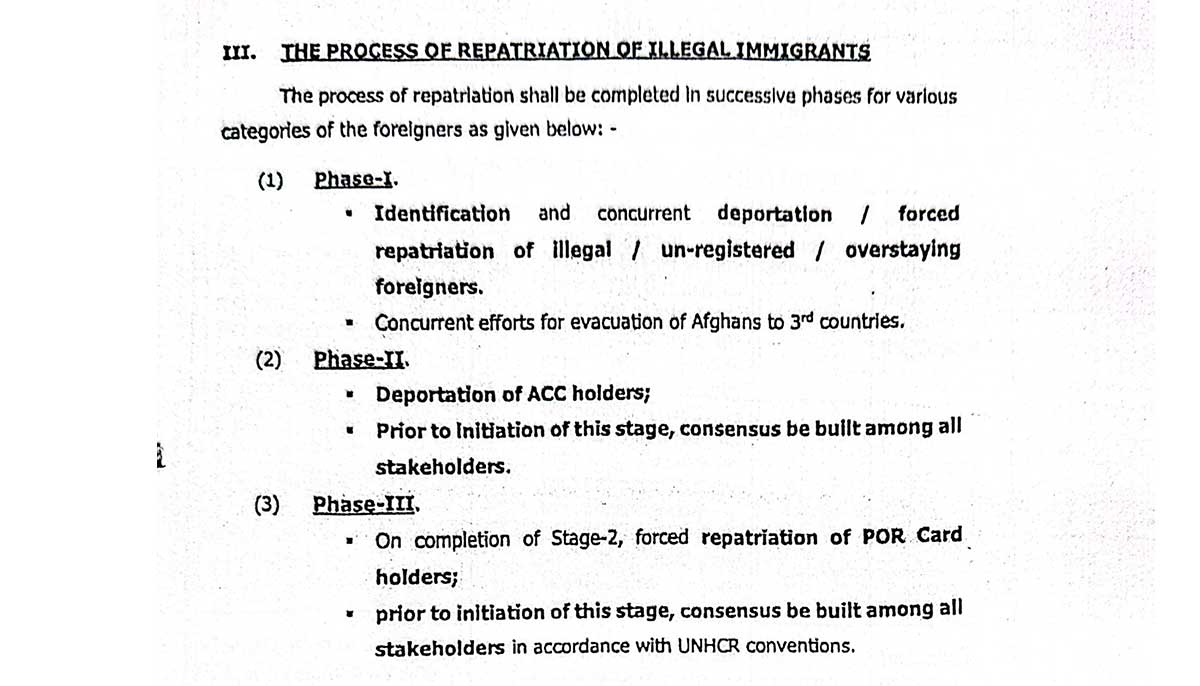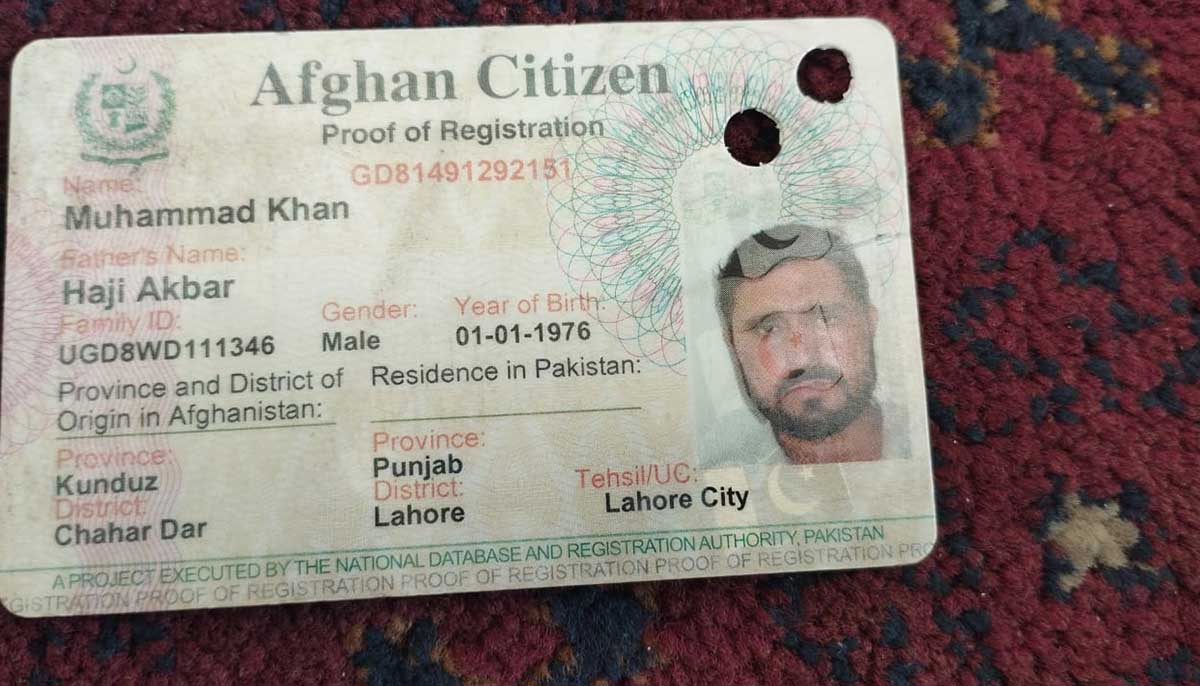Noor Muhammad, 29, has never been to Afghanistan. His father moved from Afghanistan to Pakistan at the age of nine.
Born and raised in Pakistan’s eastern city of Lahore, Noor completed his medical education at Fatima Memorial College in 2021.
Then late last year, his life took a tumultuous turn when Pakistan ordered all foreigners to leave the country or face expulsion. While earlier the government insisted that it only planned to expel refugees with no paper-work, it was later revealed it will also be forcing out documented refugees like Noor Muhammad, who hold government-approved Proof of Registration (PoR) cards.
“We are living [in Pakistan] legally,” Muhammad told Geo News, “This document [PoR] was given to us by the [Pakistani] government. So why are we being asked to leave?”
Pakistan is home to an estimated 3.8 million Afghans, with 1.34 million holding PoR cards and 690,000 possessing ACC cards, according to the government-run Commissionerate for Afghan Refugees in Khyber Pakhtunkhwa. The remaining lack formal documentation.
Officially, PoR card holders in Pakistan are entitled to work, open bank accounts, rent homes and obtain mobile SIMS cards. But Afghans Geo News spoke to report that these privileges are not accessible to them in practice.
Noor Muhammad, who graduated in 2021, has struggled to find employment in the last two years. “Whenever I apply for a job, they reject me on seeing my PoR card,” he lamented.
The PoR cards were issued to Afghan refugees first in 2007, by the Government of Pakistan through its National Database and Registration Authority (NADRA). Since then the validity of the cards have been periodically extended by the ministry of states and frontier regions.
On Friday, the federal cabinet once again extended the validity of the cards till June 30, although it announced that documented refugees will be repatriated soon, without providing an exact date for the deportation.
The government’s recent announcements have plunged Noor and other refugees like him into a state of limbo.
“What will happen after [June]? Will they kick us out?” Muhammad asked, “You go into depression just thinking about such things.”
What does the government plan to do?
An internal document titled the “Illegal Foreigners’ Repatriation Plan,” circulated by the Ministry of Interior in September 2023, sheds light on the government’s phased approach to deport Afghan refugees.
Phase one, initiated in September last year, targeted undocumented and unregistered refugees, resulting in the ‘voluntary’ and forced repatriation of 720,000 individuals thus far, Qadir Yar Tiwana, the spokesperson of the Ministry of Interior told Geo News over the phone.
Phase two involves the deportation of Afghan Citizen Card (ACC) holders, issued to undocumented Afghans in 2017.
The third and final phase entails the forced repatriation of PoR card holders, subject to consensus-building with stakeholders and compliance with UNHCR convention, the document states.
It is important to note that while the government rhetoric emphasises “voluntary return” and “repatriation,” in internal documents it uses the words “forced repatriation” and “deportation.”

To justify its policy, Pakistan’s government has repeatedly blamed Afghan nationals for increase in violence in the country, including recent suicide bombings.
However, requests for evidence to substantiate these claims have been met with silence from government officials. In December, Geo Fact Check reached out to then interior minister Sarfraz Bugti to corroborate the claim, but he did not respond to any of the requests for comments.
This week, the Minister for Interior Mohsin Raza Naqvi also did not reply to Geo News requests for comments about the status of legal Afghans.
For now, Fazal Rabi, the director repatriation at the Commissionerate for Afghan Refugees in Khyber Pakhtunkhwa told Geo News, that the federal government has not issued a clear deadline for when the second phase, therefore the deportation of ACC holders, is to begin across the country.
“[The authorities] are mapping where the ACC holders live and how many they are exactly,” Rabi explained.
Arshad Rana, the commissioner at the Commissionerate for Afghan Refugees in Punjab also said that while it was earlier decided to begin phase two by April 15, “but we have not received a go-ahead [from the federal government] as yet.”
What next?
As the government’s decisions remain pending, the stress and anxiety among Afghan refugees in Pakistan continue to escalate.
“We are under a lot of stress,” Muhammad Khan, a PoR card holder, told Geo News, “I am barely going to work these days. I don’t know what will happen or when the government will tell us to leave.”
Khan, 49, came to Pakistan when he was a minor. For the last few years, he has been running a small poultry feed business in Lahore.
“The government needs to clearly tell us what they plan to do with us,” Khan said, “It took me several decades to set up a life here, now will I have to restart my life in Afghanistan?”

Government officials Geo News spoke to have also expressed their concerns about the government’s deportation policies, admitting it could lead to diplomatic challenges and a potential backlash.
“PoR card holders have refugee status,” Rana said, “If we try to deport them there could be a lot of issues for us internationally. I don’t know how the government plans to do this to be honest.”
Rabi agrees. “In phase one [of the deportation] we sent back undocumented and illegal refugees, so there was little pressure [internationally]. But now, there will be pressure.”
Late last year, human rights groups also submitted a petition in the Supreme Court of Pakistan to stop the mass deportation of Afghan refugees, but the petition is still awaiting judgment.


